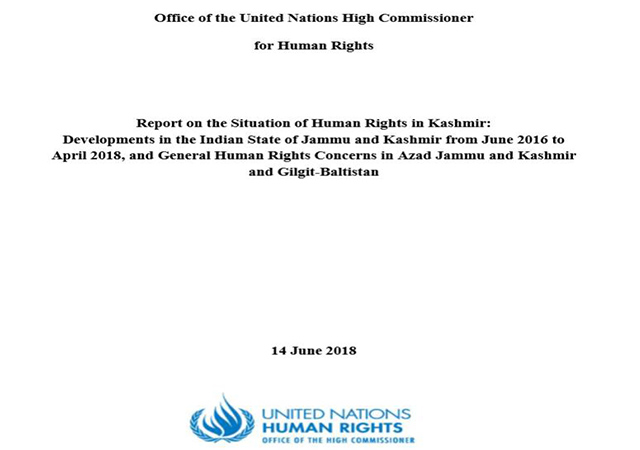 [Report cover picture taken from the United Nations Office of the High Commissioner for Human Rights]
[Report cover picture taken from the United Nations Office of the High Commissioner for Human Rights]
[This is an excerpt from an opinion piece in the current edition of The Round Table: The Commonwealth Journal of International Affairs.]
In 2018, the United Nations Office of the High Commissioner for Human Rights (OHCHR) released an unprecedented report on human rights violations in Kashmir. A significant focus of the report was on the human rights abuses in Indian-administered Kashmir, where allegations of torture, sexual violence, excessive use of force and disappearances have long been rampant. However, the report also highlighted serious violations on the Pakistani side. While emphasising that the violations in the two regions controlled by Pakistan – namely Azad Jammu and Kashmir (AJK) and Gilgit Baltistan – are of a different magnitude and more structural in nature, OHCHR made a number of recommendations for both India and Pakistan. In 2019 the UN body noted that neither country had taken any concrete steps to improve the human rights situation in either part of Kashmir.
As soon as the report was released, India responded with an outright rejection, criticising OHCHR among other things for ignoring cross-border terrorism. Meanwhile, Pakistan welcomed the proposal to set up an inquiry commission to investigate the violations by the Indian state, but remained mute on the recommendations directed towards itself. In many ways the reactions to the report by both countries encapsulated the historic India-Pakistan position over Kashmir. Over the past 72 years, both nation-states have pointed fingers towards the other. India accuses Pakistan of terrorism and Pakistan argues that this stance deflects attention from the human rights abuses on the Indian side, turning the world’s attention away from Indian atrocities. For Kashmiris, this has meant that their genuine grievances are too often ignored amid the tit-for-tat sloganeering and blame game.
Between 2014 and 2017, I travelled along the Line of Control (LoC) in AJK to understand the ramifications of the conflict on people living on the Pakistani side. As the UN report underscored, limited information is available on this part of Kashmir, not least because of limits on freedom of expression, opinion, peaceful assembly and association. Literature which challenges the Pakistani narrative on Kashmir is often prohibited. In 2016, sixteen books written by pro-independence writers were banned by the AJK government. This is one way that dissent is curbed in the region. The result is that most Pakistanis, and those outside Pakistan, have little insight into the state of affairs in the region.
My research reinforced the key issues highlighted by OHCHR. Several Kashmiris I interviewed spoke of constitutional and legal structures that impinge on human rights and criticised restrictions on freedom of speech. Specifically, nationalists in the region, who wish for an independent Kashmir which belongs to neither India nor Pakistan, registered their frustration at not being able to contest elections or register a party which represents their views. This is because a provision in the 1974 AJK Interim Constitution Act prevents any person or political party from engaging in any activity which is detrimental to the ideology of the state’s accession to Pakistan. Others spoke of the heavy presence of military and intelligence forces in the region, surveillance activity and the marking of anyone with nationalist sympathies. Women and children living by the LoC, who face the brunt of ceasefire violations when men move to cities for jobs, also spoke of their demands for bunkers going unheard even when cross-LoC firing has remained frequent and results in a high number of casualties annually. In Gilgit-Baltistan, the misuse of anti-terrorism laws to implicate activists also remains an ongoing issue.
While an equivalency cannot and should not be drawn to the use of force by the Indian state in Kashmir and the growing suppression of voices since 5 August 2019 – when Kashmir’s special status was revoked in the Indian Constitution – these ‘structural’ challenges on the Pakistani side have serious repercussions for the rights and freedom of Kashmiris. They are also detrimental to Pakistan’s official policy on Kashmir. By harping on the UN’s role to mediate the Kashmir conflict on the one hand and refusing to follow UN recommendations on the other, Pakistan weakens its own case.
Anam Zakaria is a freelance writer.



